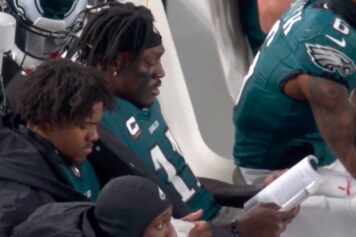The history of the NFL is rife with proud men who accomplished Herculean feats against all odds, feats that not many men had the intestinal fortitude, desire or skill to accomplish. No, we’re not talking about driving the length of the field in a driving blizzard and subzero temperatures, pushing a staunch defense back on their heels in the last minute of a game. We're referring to men whose impact goes beyond the stat book. Individuals of great significance in the annals of professional football whose presence was integral to the modern game, yet who have gone unrecognized for over 60 years by those who stand upon their shoulders as pompous usurpers of a throne that once was synonymous with integrity, grace and perseverance.
These football greats were Kenny Washington, Woody Strode, Marion Motley and Bill Willis. They re-integrated professional football in the United States a full year before Brooklyn Dodgers owner Branch Rickey called up Jackie Robinson to become the first African American to play in Major League Baseball. In the upcoming EPIX documentary Forgotten Four: The Integration of Professional Football, director Johnson McKelvy crafts a work of art that should not only be mandatory viewing for every player in the NFL, but for every pop warner, high school and collegiate practitioner of the craft as well. Some amateur historians may recall that the National Football League was initially integrated by Charles Follis with the Shelby Steamfitters in 1904. Fritz Pollard, along with Paul Robeson, were considered by many as some of the first African American stars in 1920, but they would always be relegated to the shadows as the media rained adulation upon Red Grange and others.
Pollard would also become the first African American head coach in the NFL in 1921 as a player-coach with the Akron Pros. Though racism was rampant as ever during this time, Pollard’s exceptional abilities on the field of play, and the newness of the professional game, afforded him the opportunity to play. However, with the crash of the stock market in 1929 came calls to reserve paid playing opportunities for white players. It was not until 1946 that African Americans were reluctantly allowed to play on the professional level again.
In the Forgotten Four, viewers are treated to exceptional first hand commentary from the great Don Shula (Cleveland Browns 1951-52), Bob Gain (Cleveland Browns 1952-64) and others who saw these greats play in their prime. Shula recalls with affection how Browns’ coach Paul Brown promoted a family atmosphere that was inclusive of African American players, something that was unheard of in any professional sport until well into the late 60s.
Gain hilariously recalls how whenever Marion Motley and Bill Willis were the subject of unnecessarily rough treatment by the opposition, he would be called in to make sure things were made right, even if he had to do a whole lot of wrong to make it happen. But the documentary also illustrates how the Cleveland Browns organization had to go through extraordinary efforts to defend Motley and Willis from death threats.
Meanwhile, the road to respectability and acceptance for Woody Strode and Kenny Washington was tainted by racism from both within and outside of the Los Angeles Rams organization as owner Dan Reeves only reluctantly agreed to sign them. Not only did they face threats from their opponents, but many of their teammates would take cheap shots at them as well. Forgotten Four also includes expert historical context by director of the Schomberg Center for Research in Black Culture Khalil Gibran Muhammad, Hall of Fame player Joe Horrigan, former Los Angeles Sentinel Brad Pye, Jr., USA Today columnist Jarrett Bell and many others who provide perspective. Forgotten Four features narration from critically-acclaimed actor Jeffrey Wright and creative consultation from former NFL player Donovan McNabb.
Forgotten Four, which airs Tuesday September 23rd on EPIX, does not attempt to homogenize or candy-coat any of the harsh realities of rabid racism faced by these pioneers of the game. What it successfully accomplishes is to paint a realistic vision of the burdens endured by men who were titans of endurance, persistence and temperament.
The Shadow League gives this masterfully crafted documentary an A.



